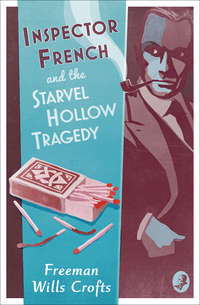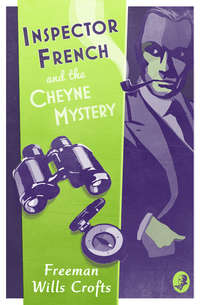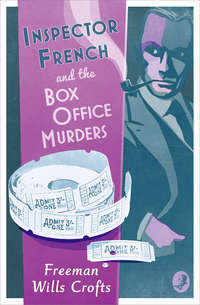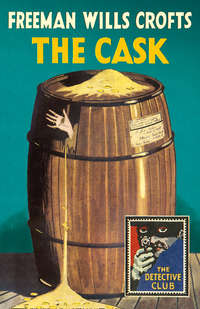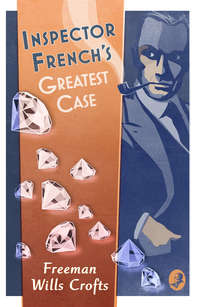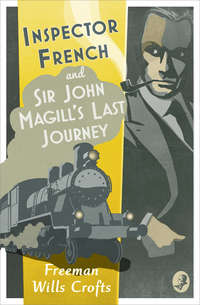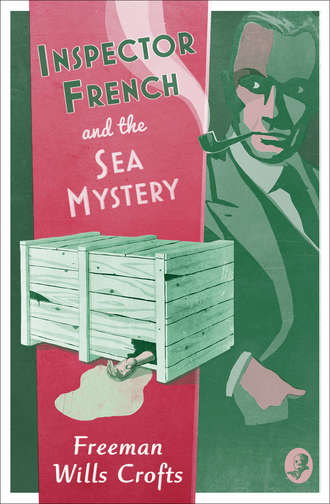
Полная версия
Inspector French and the Sea Mystery
He was himself rather out of his depth among the unfamiliar figures and formulæ given on the subject. The problem was, how long would it take 579 lbs. of water to run through seven one-sixth inch holes? This, he found, depended on the head, which he could only guess at approximately one foot. He worked for a considerable time, and at last came to the conclusion that it would take slightly over an hour. But that his calculations were correct he would not like to have sworn.
At all events these results were extremely promising, and gave him at least a tentative working theory.
But if the crate had floated from the coast to where it was found, the question immediately arose: At what point had it been thrown in?
Here was a question which could only be answered with the help of local knowledge. French thought that a discussion with the coastguard might suggest ideas. Accordingly he left the hotel and turned towards the harbour with the intention of looking up Manners.
3
Experimental Detection
Tom Manners was hoeing in his little garden when French hailed him. He was not a native, but the course of a long career had led him from Shoreditch, via the Royal Navy, to Burry Port. In person he was small, stout, and elderly, but his movements were still alert and his eyes shone with intelligence.
‘I want to have another chat with you about this affair,’ said French, who had already heard the other’s statement. ‘Just walk down to the end of the pier with me while we talk.’
They strolled down past the stumpy lighthouse to where they could get a view of the Inlet.
Again it was a perfect afternoon. The sun, pouring down through a slight haze, put as much warmth as was possible into the somewhat drab colours of the landscape, the steel of the water, the varying browns of the mud and sand, the dingy greys and slate of the town, the greens of the grass and trees on the hills beyond. Some four miles away to the right was the long line of Llanelly, with its chimneys sticking up irregularly like the teeth of a rather badly damaged comb. Fifty-three chimneys, French counted, and he was sure he had not seen anything like all the town contained. Beyond Llanelly the coastline showed as a blur in the haze, but opposite, across the Inlet, lay the great yellow stretch of the Llanrhidian Sands, rising through grey-green dunes to the high ground of the Gower Peninsula.
‘Let us sit down,’ French suggested, when he had assimilated the view. ‘I have come to the conclusion that the crate must have been thrown into the sea at some point along the shore and floated out to where it was found. It would float, I estimate, for about an hour, when enough water would have got in to sink it. Now what I want to know is, where, along the coast, might the crate have been thrown in, so as to reach in an hour the place at which it was found?’
Manners nodded, but did not reply. French unrolled his map and went on: ‘Here is a map of the district, and this is the point at which the crate was found. Let us take the places in turn. If it had been thrown in here at Burry Port, would it have got there in time?’
‘It ain’t just so easy to say,’ Manners declared slowly. ‘It might, if the tide was flowing, and then again it mightn’t. It might ’ave started ’ere or from Pembrey—that’s ’alf a mile over there to the west.’
This was not encouraging, but French tried again.
‘Very well,’ he said. ‘Now what about Llanelly?’
Llanelly, it appeared, was also a doubtful proposition.
‘It’s like this ’ere, Mr French,’ Manners explained. ‘It’s all according to ’ow the tide ’appens to be running. If the tide was flowing and that there crate was dropped in at Llanelly, it would go farther up the Inlet than wot you show on the chart. An’ if the tide was ebbing it would go farther down. But if the tide was on the turn it might go up or down and then come back to the place. You see wot I mean?’
French saw it and he sighed as he saw also that it meant that there was practically no part of the adjacent shores from which the crate might not have come. Then it occurred to him that both his question and Manners’ reply had been based on a misconception.
The murderer’s object was to get rid of the crate. Would he, therefore, choose a rising or half tide which might drift it back inshore? Surely not; he would select one which would take it as far as possible out to sea. French felt that only ebb tides need be considered. He turned again to Manners.
‘I suppose a good ebb develops some strong currents in these channels?’
‘You may say so, Mr French. An average of five knots you may reckon on. A deal faster than you could walk.’
‘Five knots an hour?’
‘No, sir; five knots. It’s like this ’ere. A knot ain’t a distance: it’s a speed. If I say five knots I means five sea miles an hour.’
‘A sea mile is longer than an ordinary one?’
‘That’s right. It varies in different places, but you may take it as 6080 feet ’ere.’
French made a short calculation.
‘That is about five and three-quarter English miles per hour,’ he remarked, as he scaled this distance up the Inlet from the position of the crate. And then his interest quickened suddenly.
A little over five miles from the point at which the crate had sunk the estuary narrowed to less than a quarter of a mile in width. At this point it was crossed by two bridges, carrying respectively the main road and the railway between Swansea and Llanelly. Had the crate been thrown from one of these?
French saw at once that no more suitable place for the purpose could be found. Objects pushed in from the bank would tend to hug the shore and to be caught in backwaters or eddies. Moreover, even if they escaped such traps they would not travel at anything like the maximum speed of the current. But from a bridge they could be dropped into the middle of the stream, where the flow was quickest.
‘What about the bridge up at Loughor?’ he asked. ‘If the crate was dropped off that on an ebb tide, do you think it would get down all right?’
Manners was impressed by the suggestion. Given a good ebb, about an hour should carry the crate to where it was found. French rose with sudden energy.
‘Let’s go and see the place. How soon can we get there?’
By a stroke of luck a train was approaching as they entered the station, and twenty minutes later they reached their destination.
Loughor proved to be a straggling village situated on the left bank of the estuary where the latter made a right-angled bend towards the north. The two bridges ran side by side, and a couple of hundred yards apart. That carrying the road was a fine wide structure of ferro-concrete, fairly new and leading directly into the village. The railway bridge was lower down stream, considerably older and supported on timber piles. Both were about three hundred yards long, and built with short spans and many piers. The tide was out, and the usual wide mud banks were exposed on either shore.
Directly French saw the spot he felt that here indeed was what he sought. On a dark night it would have been easy to drop the crate from the road bridge in absolute secrecy. Nor, as far as he could see from the map, was there any other place from which it could have been done.
He had assumed that the criminal would select an ebb tide for his attempt in order to ensure the crate being carried as far as possible out to sea. For the same reason French believed he would choose the time of its most rapid run. That time must also be in the dead of night to minimise the risk of discovery from passing road traffic. From 2 to 4 a.m. would probably best meet the conditions, as the chances were a thousand to one that the road would then be deserted.
French wondered if he could get anything from these considerations. He turned to Manners.
‘I suppose it takes a bit of time to get up a good run in an estuary like this? How soon after high water would you say the current was running at full speed under the bridge?’
‘From one to two hours, more or less.’
One to two hours previous to the period 2 to 4 a.m. meant between midnight and 3 a.m.
‘Now, Mr Manners, can you tell me whether high water fell between twelve and three on any night about five or six weeks ago?’
Manners once more produced his tide table.
‘Five or six weeks ago,’ he repeated slowly. ‘That would be between the 16th and the 23rd of August.’ He ran his stubby finger up the pages, then read out: ‘“21st, Sunday, 0.5—” that’s five minutes past midnight, you understand. “22nd, Monday, 1.23 a.m.; 23rd, Tuesday, 2.55. a.m.” ’Ow would that suit you, sir?’
‘All right, I think,’ French answered, as he noted the three dates. ‘Any of those top springs?’
‘No, sir, you don’t get ’igh water of springs at night. ’Bout six or seven o’clock it runs. Those dates wot I gave you are about dead neaps.’
‘But there is still a strong flow at neaps?’
‘Oh, bless you, yes. Not so strong as at springs o’ course, but plenty strong enough.’
All this seemed satisfactory to French, and he felt a growing conviction that the small hours of the 21st, 22nd, or 23rd of August had witnessed the launch of the crate. But this was mere theory, and theory is popularly admitted to be worth only one-sixteenth of the value of practice. Could he not arrive at something more definite?
Suddenly he thought he saw his way.
‘You say it was neap tides on those three dates in August? What rise and fall does that represent?’
‘’Bout eighteen feet.’
‘How soon shall we have that again?’
‘Not for nearly a week we shan’t. Say next Monday.’
‘I can’t wait for that. What’s the rise tomorrow?’
‘Twenty-one foot eleven.’
‘And what hour is high water?’
‘Eight o’clock in the morning.’
‘That’ll have to do. Look, here is a bus labelled “Llanelly.” Let us get aboard.’
At the police station they found not only the superintendent, but Chief Constable Lloyd.
‘Glad to see you together, gentlemen,’ French greeted them. ‘I’ve been going into the matter of tides and currents in the Inlet with Mr Manners here, and now I want your help in trying an experiment. Manners informs me that about six weeks ago, the time at which the doctors believe our man was murdered, it was high water in the dead period of the night. Tomorrow, Thursday, it will be high water at 8. a.m. The maximum run out to sea, Manners says, will begin between one and two hours later, say at 9.30 a.m. Now, gentlemen, I want to load the crate with a weight equal to that of the body and throw it into the estuary from the Loughor bridge at 9.30 tomorrow morning. Will you help me?’
While French had been speaking the three men had stared uncomprehendingly, but as he reached his peroration something like admiration showed on their faces.
‘Well, I’m blessed,’ the superintendent said slowly, while Major Lloyd gave the suggestion his instant approval.
‘Glad you agree, gentlemen,’ said French. ‘Now, if we’re to be ready, we shall want a few things arranged. First we’ll have to put stones in the crate to equal the weight of the body. Then we’ll want a carpenter to repair the top where Mr Morgan broke it. He’ll have to make it water-tight with pitch or putty or something. I don’t want it to take any water through the cracks. A lorry will also be needed to carry the crate to the bridge, and three or four men to lift it over the parapet.’
‘Very good,’ the chief constable answered. ‘Nield can arrange all that. Advise him, will you, Superintendent. But you’d better see him yourself, Inspector, and make sure he forgets nothing. Anything else?’
‘Yes, sir. We don’t want to lose the crate. We shall want a rope round it and a boat in attendance.’
‘You can fix that up, Manners, can’t you?’
‘Certainly, sir. I’ll see to it.’
‘Good. I’ll come down to watch the experiment. Shall we say 9.30 a.m. at the bridge?’
At nine o’clock next morning two vehicles left the Burry Port police station. The first was a lorry and on it stood the crate, repaired and loaded with the necessary weight of shingle, due allowance having been made for the fact that the wood was now waterlogged. Behind followed a car containing French, Nield, and three constables in plain clothes.
The weather was ideal for their purpose. The fine spell had lasted and the sun shone with a summery warmth and brilliance. Not a breath of wind dulled the shining surface of the Inlet, now calm and placid at the turn of the tide. Inland the hills showed sharp against the clear blue of the sky. Out beyond the Gower Peninsula was a steamer going up to Swansea or Cardiff.
The chief constable and Superintendent Griffiths were waiting for them at Loughor. Already the tide was running swiftly, swirling and eddying round the piles of the bridge. Moored to the bank at the east end was a broad-beamed boat with Manners in the sternsheets and two oarsmen amidships.
‘Good heavens, they’ll never row against that current!’ French exclaimed, aghast at the rushing flood.
‘They’re not going to try,’ Nield declared. ‘This is what I’ve arranged with Manners. He has an extra long painter fixed to his boat. We’ll get the end up on the bridge and tie it to the Crate. Then we’ll throw crate and rope over together, and Manners can pull the slack of the rope into the boat and float down beside the crate.’
‘Right. Let me get into the boat first and then carry on.’
French scrambled down the stone pitching of the bank and with some difficulty got aboard. The rope had been passed up to the bridge and was now worked across till the boat was nearly in mid-stream. Even with the help of the oarsmen it was all those above could do to hold on. Then the crate appeared rising slowly on to the parapet. Presently it turned over and fell, the rope being thrown clear at the same time.
The crate entered the water with a mighty splash, drenching the boat with spray and disappearing momentarily beneath the surface. Then it came up again, and bobbing about like some ungainly animal, began to move quickly downstream. The boatmen rowed after it, while Manners hurriedly pulled in the slack of the rope.
After the first few plunges the crate settled down on what might be called an even keel, floating placidly down the estuary. They were rapidly approaching the railway bridge, the roar of the water through the piles being already audible. The passage was not without danger, and the oarsmen worked hard to keep the boat clear of the piles and to ensure its passing through the same opening as the crate. Then with a rush they were through and floating in the calm water beyond.
French enjoyed that unconventional trip down the Inlet. Apart from the interest of the quest, the glorious weather and the charming scenery made it a delightful excursion. Borne on by the current they first hugged the salt marshes of the northern shore, then heading out towards mid-channel, they passed the post on Careg-ddu and rounded the point at the Llanelly rifle range. They kept inside the long training bank or breakwater, and passing the entrance to Llanelly harbour, stood out towards the open sea. From the water the high lands north and south looked rugged and picturesque, and even the dingy buildings of the town became idealised and seemed to fit their setting. French took frequent bearings so as to be able to plot their course on the map.
The crate had been settling down steadily, and now only about two inches of freeboard showed, every tiny wavelet washing over it. The rope had been carefully coiled so as to run out easily when the time came. Presently the crate was entirely awash, and the air escaping through the upper holes bubbled as the little surges covered them. Then it was below the surface, showing like a phantom under the waves. At last, just one hour and seven minutes after they had left the bridge, it slowly vanished from sight, and the rope began to run out.
‘That will do,’ French said as soon as he had taken bearings. ‘That’s all I want. We may haul it up and get ashore.’
They followed the example set by Mr Morgan, and pulling up the crate until the top was showing beneath the surface, made the rope fast to the after thwart and pulled for the Burry Port harbour. There they beached their burden, the sergeant undertaking to salve it when the tide fell.
French, delighted with the result of his experiment, hurried to the hotel and plotted their course on his map. And then he was more delighted still. The crate had passed within fifty yards of its previous resting place.
It was true it had gone nearly half a mile farther, but that was to be expected and was attributable to the greater fall of the tide.
That the crate had been thrown from the Loughor bridge on the night of the 21st, 22nd, or 23rd of August French had now no doubt. The first problem of the investigation had therefore been solved, and he congratulated himself on having made so brilliant a start in his new case.
But as was usual in criminal investigations, the solution of one problem merely led to another: how had the crate been transported to the bridge?
There were three possibilities: by means of a handcart, a horse cart, or a motor lorry. All, however, had the serious objection that it would take at least three men to lift the crate over the parapet. Murders, of course, were sometimes the work of gangs, but much more frequently they were carried out by individuals, and French would have preferred a theory which involved only one man. However, there was nothing for it but to follow the theory which he had.
As far as he could see the only factor differentiating between the three vehicles was that of radius of operation. If a handcart had been used the body must have been brought from Loughor, Bynea, or some other place in the immediate vicinity. The same remarks applied to a horse vehicle, though to a lesser extent. With a motor the distance travelled might have been almost anything.
French did not believe that the body could have come from anywhere near by. Had anyone disappeared or left the neighbourhood under suspicious circumstances the police would have known about it. The motor lorry was therefore the more likely of the three.
He began to see the outlines of an inquiry stretching out before him. Had anyone seen a motor, loaded with something which might have been the crate, in any part of the surrounding country on the night of the 21st, 22nd, or 23rd of August?
Going to the police station, French rang up the chief constable, reported the result of the experiment, and asked him to see that his question was circulated, not only among the Carmarthenshire police, but also among those of adjoining counties. Then, thinking he had not done so badly for one day, he returned to the hotel for lunch.
A good deal of the afternoon he employed in speculating as to what he should do if there were no answer to his circular, but next morning he was delighted to find that his labour had not been in vain. Sergeant Nield appeared to say that there had just been a message from the police at Neath, saying that a lorry answering to the description had been seen on the evening of Monday, 22nd August. It was fitted with a breakdown crane and carried a large package covered with a tarpaulin which might easily have been the crate. A constable had seen it about eight at night standing in a lane some two miles north of the town. The driver was working at the engine, which he said had been giving trouble.
‘That’s a bit of good news, sergeant,’ French said heartily. ‘How can I get to this Neath quickest?’
‘Direct train via Swansea. It’s on the main line to London.’
‘Right. Look up the trains, will you, while I get ready.’
French had little doubt that he was on a hot scent. He had not thought of a portable crane, but now he saw that nothing more suitable for the purpose could be obtained. There were, he knew, cranes—auto-cranes, he believed they were called—which were fixed on lorries and used for towing disabled cars. In certain types the jibs could be raised or lowered under load. With the jib down a load could be picked up from the ground behind the lorry. The jib could then be raised to its highest position and if the load was right up at the pulley it would clear the tail end of the lorry. When the load was lowered it would come down on the lorry. And all this could be done by one man.
As French closed his eyes he seemed to see the reverse process being carried out; a crane-lorry arriving on the Loughor bridge, stopping, backing at right angles to the road until its tail was up against the parapet—the road was wide enough to allow of it; the driver getting down, taking a tarpaulin off a crate, swinging the crate up to the pulley of his crane, lowering the jib until the crate swung suspended over the rushing flood beneath, then striking out some type of slip shackle which allowed the crate to fall clear. It was all not only possible but easy, and French had not the slightest doubt that it had been done.
A couple of hours later he was seated in the police station at Neath, listening to Constable David Jenkins’s story.
It seemed that about eight o’clock on the night of Monday, the 22nd of August, Jenkins was walking along a lane leading through a small spinney some two miles north of the town when he came on a lorry drawn in close to one side. It was fitted with a crane such as is used for motor breakdowns, and behind the crane was an object covered with a tarpaulin. This object was rectangular shaped and about the size of the crate. There had been engine trouble which the driver was trying to make good. Jenkins paused and wished the man goodnight and they talked for a few minutes. The man was slightly over middle height and rather stout, and was dressed as a lorryman—a working man evidently. He had reddish hair, a high colour, and glasses, and Jenkins felt sure he would know him again. The man explained that he was going from Swansea to Merthyr Tydfil, and had got out of his way in trying to take a short cut. Then his engine had broken down and he was thus kept very late. But he had now found the defect and would be able to get on in a few minutes. Jenkins had stayed chatting, and in five minutes the man had said: ‘There, that’s got it,’ and had closed up the bonnet and moved off.
‘Coming from Swansea, was he?’ French said. ‘Does that lane lead from Swansea?’
‘Oh, yes, it leads from Swansea all right, but it doesn’t lead to Merthyr Tydfil.’
‘Where does it lead to?’
‘More like to Pontardawe.’
That was all right. French was delighted with the way news was coming in. That the constable had seen his man he did not doubt.
At the time, Jenkins went on, it had struck him as curious that a breakdown lorry should be used for transporting goods. But on reading French’s circular he had seen that here was a plant which would lift the goods over the parapet of a bridge. And when he remembered that the tarpaulin covered object was about the size given, he felt he ought to report the occurrence.
‘Quite right, constable,’ French said heartily. ‘I am sure your superiors will not overlook your action.’
French’s next step was clear. A crane-lorry should not be difficult to trace. He would go back to Swansea and put the necessary inquiries in train.
4
A Change of Venue
On reaching Swansea, French looked up Superintendent Howells at the police station.
‘Glad to see you, Mr French,’ the superintendent greeted him. ‘I’ve known your name for a considerable time, and since I heard you were down over this job I’ve been hoping we should meet. That Neath report any good to you?’
‘I think so,’ French answered. ‘It sounds promising at all events. On the strength of it I’ve come in to ask for your help.’
‘That’s all right. What do you want us to do?’
‘I want to trace the lorry your man saw out at Neath. I’ve got his description of it, and I must say that seeing he suspected nothing at the time he observed it pretty closely. A smart man, superintendent.’


